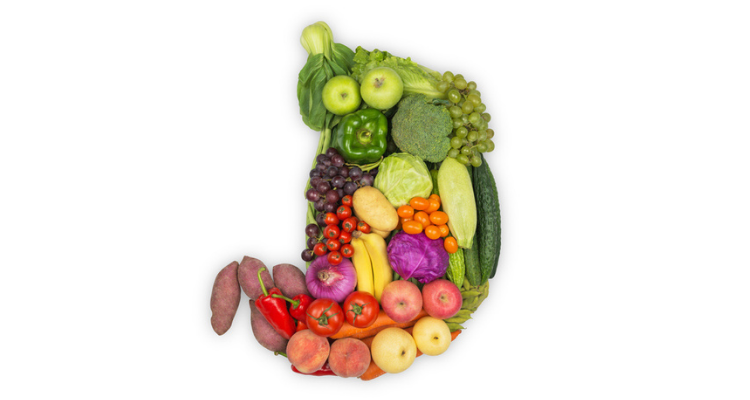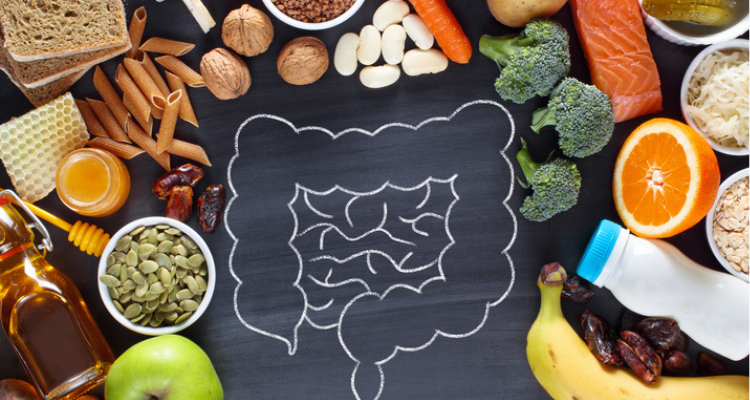
To most people, a healthy gut means being free of digestive sensations like bloating, gas, or stomach discomfort. Gut health is important for many reasons—particularly because it is connected to nearly all body systems, and many experts believe it to be the foundation of overall wellbeing.Foods act as medicine, and the following foods can either support or destroy a well-functioning gut:
Best types of food for gut health:
- Probiotic foods
- Prebiotic foods
- Bone broth
- Healthy fats
- Vegetables and fruits
Worst types of food for gut health:
- Refined sugar
- White bread and other refined grains
- Trans fats
- Dairy
- Gluten
Let's dive into which foods fit into these categories and how they build or break down a healthy gut.
gut health: the foundation of wellness
Our understanding of the connections between the digestive system and other body systems is captured by the following terms:
- Gut-brain axis
- Gut-heart axis
- Gut-skin axis
- Gut-oral axis
- Gut-liver axis
- Gut-immune axis
- Gut-hormone axis
This list shows how critical gut health is to key bodily processes, and why so many integrative doctors start with gut health when addressing their patients' discomforts. Because of these links between the GI tract and the rest of the body, poor gut health can contribute to many long-term health challenges.
Nutritional supplements and herbs might be recommended to support a troubled gut, but a better place to start your healing journey is including certain foods and eliminating others.

five best foods for gut health
probiotic foods
Probiotics are live microorganisms naturally occurring in the gut that play many vital roles in maintaining homeostasis and health. Aside from supplements, they are readily available in whole-food form and can be enjoyed daily.
You might be familiar with “good” versus “bad” bacteria. More accurately, some of the trillion bacteria in the gut are critical to good health, while others can be damaging. When the balance of “good” versus “bad” is skewed, processes such as the immune response, detoxification, and hormonal balance can suffer.
The best food sources of probiotics include raw sauerkraut, kimchi, kombucha tea, kefir, miso, Nato, and plain Greek yogurt (if you aren’t sensitive to dairy).
prebiotic foods
Less widely known than probiotics, prebiotics are non-digestible carbohydrates naturally present in many high-fiber foods. They pass through the upper part of the GI tract without being digested, and are fermented by gut bacteria in the small intestines. Essentially, prebiotics are food for probiotics living in the gut.
One of the better-known types of prebiotics is a compound called an oligosaccharide, which comes in several forms. Other prebiotics include inulin and oligofructose. Much like dietary fiber, prebiotics are naturally occurring and can be included in your daily diet. The best prebiotic food sources include garlic, onions, Jerusalem artichokes, asparagus, green bananas, and green plantains.
bone broth
Homemade bone broth is not only a true superfood—it’s a convenient way to get a variety of bioavailable minerals like magnesium, calcium, phosphorus, potassium, and sulfur. Bone broth is known for supporting a healthy gut, as it is easily digestible and soothing, particularly for anyone with digestive problems. Broth allows the body to absorb the nutrients in food that an impaired GI tract might not break down and assimilate well. Gelatin is one of the key compounds in broth that provides digestive support, as it enhances gastric acid secretion and the restoration of a healthy mucosal lining. Gelatin also absorbs water and maintains fluid in the GI tract, promoting regular bowel movements.[1]
Make a large batch to freeze and have on hand to make soups, use in place of water for any recipe such as rice, stews, chilies, or curries, or sip throughout the day.
healthy fats
Various types of fats play an essential role in gut health. Omega-3 fatty acids have been shown to improve the microbiome, normalize mucosal inflammation, support heart health, and help with cell production and regeneration.[2]
Dietary fats have gotten a bad rap, but we now know that plenty of healthy fats are crucial to a balanced and nourishing diet. Good fats include olive oil, avocado oil, grass-fed butter, ghee, coconut oil, nuts, and seeds.
vegetables and fruits
Eating a diverse variety of fruits and vegetables daily is perhaps the best way to improve gut health. Not only do these plant foods provide essential vitamins and minerals to thrive, but they are also rich in gut-supporting fiber. Fiber keeps digestion regular and feeds the beneficial bacteria in the gut.
Other great fiber-rich foods include seeds, nuts, and whole grains.
five worst foods for gut health
Eating foods that help the gut is just as important as avoiding those that damage it. Strive to eliminate the following foods or consume them in very moderate amounts.
refined sugar
Research suggests that too much sugar could directly impact the composition of the gut microbiome. Excess consumption of sucrose and glucose seems to affect a bacteria called bacteroides thetaiotaomicron, which is associated with your ability to process certain healthy foods, like vegetables.[3] A high sugar intake can also contribute to yeast overgrowth in the gut[4].
Stick to natural sweeteners as often as possible, like raw honey, maple syrup, green leaf stevia, or pure monk fruit sweetener.
white bread and other refined grains
Refined grains like white bread, cereals, rolls, pastas, buns, cookies, and cakes are considered “empty calories,” since they provide very little nutritionally but are high in sugar and calories. Like refined sugar, these foods can heighten the body’s inflammatory response and contribute to an unhealthy gut microbiome.
trans fats
Also called hydrogenated or partially hydrogenated fats, man-made trans fats are added to many processed and packaged foods. They are difficult to digest and negatively impact weight management, heart function, and other aspects of health. These fats have also been found to inflame the GI tract.[5]
dairy
High-quality dairy isn’t inherently bad for everyone. Still, many people have lactose intolerances or dairy allergies they aren’t aware of. Continuing to eat dairy products with these underlying issues can cause skin problems, behavioral issues in kids, intestinal discomfort, brain fog, infrequent bowel movements, watery stools, tiredness, and overall malaise.
If any of these discomforts sound familiar, eliminate dairy for at least one month to see if your health challenges improve or resolve. If you can enjoy dairy, organic, grass-fed dairy products are higher in omega-3 fatty acids and certain minerals than conventional dairy.
gluten
Gluten, the protein in wheat, is another food commonly known to cause gut distress. Even without diagnosable celiac disease, studies show that gluten intolerances are more common than previously thought.[6] Like dairy, you can eliminate foods containing gluten from your diet for a month or more to understand their impact on your gut and overall health. You can also speak with your integrative doctor about testing for different types of gluten intolerance.
takeaway: eat for gut health
Eating for gut health is also eating for overall health since the gut is foundational to nearly every other system in the body. Strive for a diet dense with probiotic and prebiotic-rich foods, a diverse array of vegetables and fruits, healthy fats, and nourishing bone broth. Cutting out all or most processed and packaged foods will go a long way in eliminating common gut health offenders.

[1] Samonina G, Lyapina L, Kopylova G, Pastorova V V, Bakaeva Z, Jeliaznik N, Zuykova S, Ashmarin I I. Protection of gastric mucosal integrity by gelatin and simple proline-containing peptides. Pathophysiology. 2000 Apr;7(1):69-73. doi: 10.1016/s0928-4680(00)00045-6. PMID: 10825688.
[2] https://www.nature.com/articles/s41598-017-07992-1
[3] https://www.pnas.org/doi/10.1073/pnas.1813780115
[4] Man A, Ciurea CN, Pasaroiu D, Savin AI, Toma F, Sular F, Santacroce L, Mare A. New perspectives on the nutritional factors influencing growth rate of Candida albicans in diabetics. An in vitro study. Mem Inst Oswaldo Cruz. 2017 Sep;112(9):587-592. doi: 10.1590/0074-02760170098. PMID: 28902283; PMCID: PMC5572443.
[5] Okamura T, Hashimoto Y, Majima S, Senmaru T, Ushigome E, Nakanishi N, Asano M, Yamazaki M, Takakuwa H, Hamaguchi M, Fukui M. Trans Fatty Acid Intake Induces Intestinal Inflammation and Impaired Glucose Tolerance. Front Immunol. 2021 Apr 29;12:669672. doi: 10.3389/fimmu.2021.669672. PMID: 33995404; PMCID: PMC8117213.
[6] Di Sabatino A, Volta U, Salvatore C, Biancheri P, Caio G, De Giorgio R, Di Stefano M, Corazza GR. Small Amounts of Gluten in Subjects With Suspected Nonceliac Gluten Sensitivity: A Randomized, Double-Blind, Placebo-Controlled, Cross-Over Trial. Clin Gastroenterol Hepatol. 2015 Sep;13(9):1604-12.e3. doi: 10.1016/j.cgh.2015.01.029. Epub 2015 Feb 19. PMID: 25701700.


















